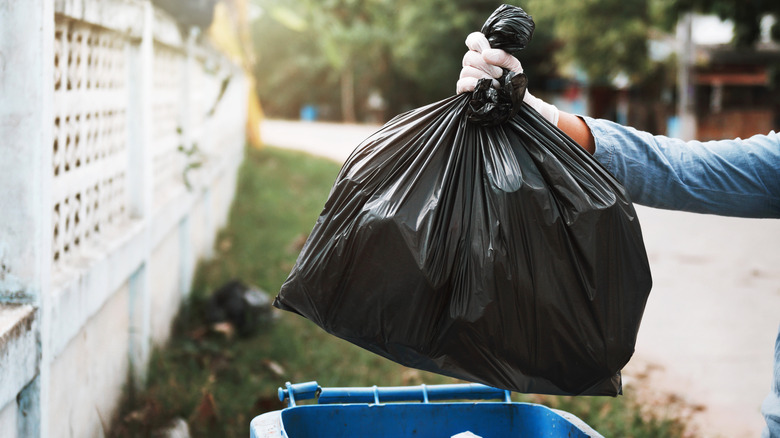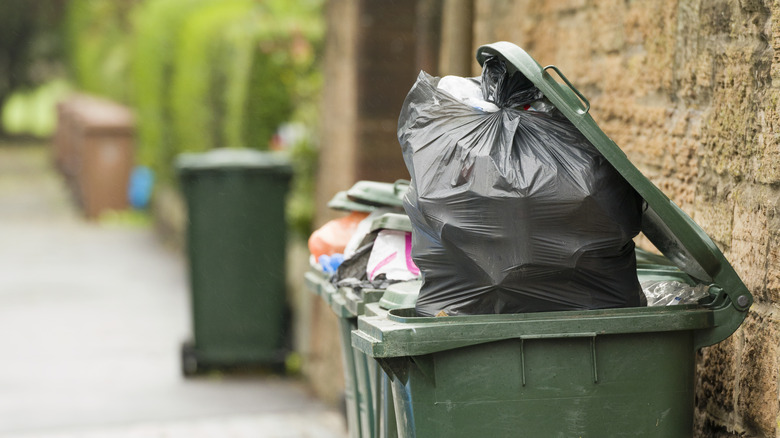If Your Trash Wasn't Picked Up, This Could Be Why
Having your trash go uncollected can be a frustrating experience, especially for those who work during the day or care for children. The routine of putting out the trash only to find it still sitting at the curb on pickup day can disrupt daily life and lead to a buildup of waste, causing major inconvenience and potential hygiene issues.
For many Americans, the trash collection schedule is a well-coordinated aspect of their weekly routine. However, missed pickups can throw this routine into disarray, forcing individuals to either store their waste for longer than anticipated or seek alternative disposal methods. Some may even have to go find trash options that can be extremely far from their residence. This situation can be particularly challenging for those with limited storage space or who live in areas with strict waste management regulations.
Let's not even get started on the health and safety risks. A disrupted trash schedule can attract pests, like bees and wasps, and emit unpleasant odors. It can also be an eyesore, detracting from the appearance of the neighborhood and potentially lowering property values. So, here's why this may happen and how to stop your trash from sitting on your curb for another week.
It may simply be all about your bin
Experiencing a missed garbage pickup can be frustrating, but understanding why it happened can help you avoid similar issues in the future. It's all about how much your bin weighs, what you put in it, and where it's placed.
First things first, your bins may have exceeded the weight limit. While it's tempting to purge your house of unwanted items, dumping too much trash into your bins at once can lead to them being skipped over on trash day. Major cities sometimes have strict weight limits for curbside pickup. For example, New York requires residents to have less than 60 pounds of trash for pickup. To find out the specific weight limit for your area, check your local sanitation department's website.
Putting out unacceptable items can result in a missed pickup, too. Batteries, hazardous materials, and large home renovation items like bricks or cinder blocks are typically not accepted for regular garbage collection. If you put out these items, your bin may not be picked up.
Improper positioning can be a culprit of a missed trash pickup, as well. Automated garbage collection services require bins to be positioned correctly with the lid on tight. Even a full bin that's slightly out of position can be skipped by a collection truck. Refer to your company's loading instructions to ensure you're following their guidelines correctly.
Other possible reasons and how to get help
If you've exhausted the options above and still find your trash bins ignored, consider if the garbage truck in your neighborhood has proper access to your bins. If obstructions like cars, basketball courts, or large snow piles block the truck, your trash is bound to be missed. For trash collectors, getting around obstructions manually can be dangerous and time-consuming. Taking care of snow and ice outside before pickup day is key. This can also be a major issue if you live nearby tight spaces, cul-de-sacs, or narrow alleyways. To prevent ice and snow from getting in the way, be wary of weather conditions and try to make the pickup easy and efficient.
You could also be getting skipped over because of your bill. If you pay directly for garbage collection services, it's essential to stay up-to-date with your payments. Failure to do so can result in your service being stopped or paused until payments are made in full and any outstanding debts are resolved. Garbage collection service stopped unexpectedly? You may have an outstanding balance. Get in contact with your local garbage company and make payment quickly to avoid any disruptions with your collection service. Be sure to keep trash services in the loop when you move around to ensure you're aware of trash limitations, bin placements, and due dates as soon as possible to keep your home and neighborhood clean.


